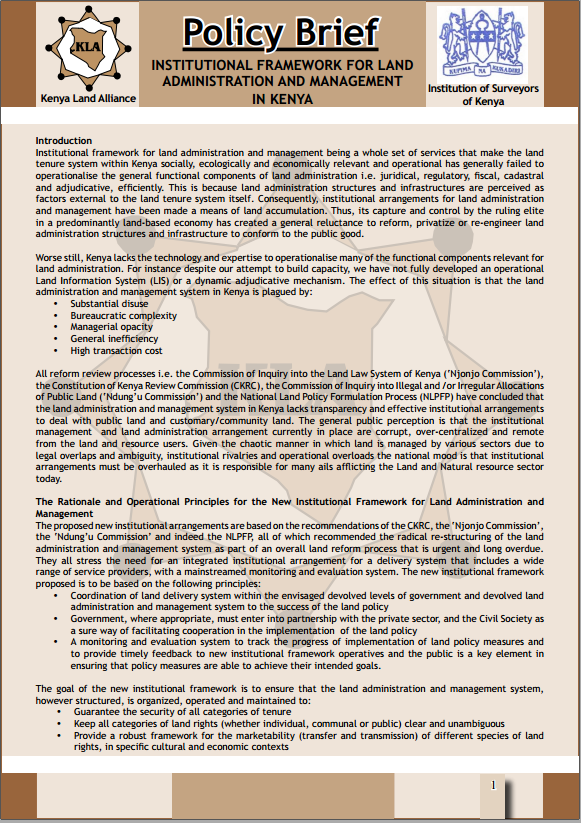The Kenya Land Alliance (KLA) is a not-for-profit and non-partisan umbrella network of Civil Society Organisations and Individuals committed to effective advocacy for the reform of policies and laws governing land in Kenya. KLA was founded in 1999 and registered as a Trust in 2001. The initiative to create an institutional framework for land laws and policy advocacy in Kenya was necessitated by the realization that the policy, legal and institutional framework created in 1950’s had become inadequate due to many changes in the social, political, economic and cultural fronts that had occurred in the country over the years.
The increased population has resulted in intense competition for access to land and natural resources. In addition, changes in the global environment brought about by globalization have combined to create a reality that is significantly different from the one existing when the
current framework was created in the 1950s. It is on this premise that KLA has been in the forefront in efforts towards effective advocacy for land laws and policy reforms in Kenya, as recently witnessed in the Presidential Commission of Inquiry into the Land Law System of
Kenya and the Constitution of Kenya Review Commission. Advocating for the formulation and implementation of a National Land Policy and review of land laws.
Our Vision
A society in which all people are assured of sustainable livelihoods through secure and equitable access and utilisation of land and natural resources.
Our Mission
To facilitate the activities of members by gathering and disseminating information towards an all-embracing, participatory and comprehensive land policy and law reforms in Kenya.
Members:
Resources
Displaying 31 - 35 of 76Unjust Enrichment: The Making of land grabbing Millionaires
Includes the grabbing of parastatal land, Agricultural Development Corporation farms, Kenya Agricultural Research Institute, Kenya Industrial Estates, Kenya Railways Corporation, National Social Security Fund, Kenya Food and Chemical Corporation Limited, State House and Military land.
Unjust-Enrichment-Volume 2
The figures of public resources estimated to have been channeled into private pockets are so high one hopes, obviously against hope, that they would turn out to be typographical errors. The figures of public resources estimated to have been channeled into private pockets are so high one hopes, obviously against hope, that they would turn out to be typographical errors.
Community Land Tenure and the Management of Community Land in Kenya
A majority of the Kenyan population live in rural areas accessing land and natural resources through customary systems and institutions that operate largely outside the mainstream legal framework of land administration. Although there are clear provisions in the Constitution and the Trust Land Act on management of trust land there appears to be an unwritten policy on the part of government that sees community land as land that is not owned but rather is available for County Councils and government to appropriate through the setting apart procedure
Righting The Wrongs: Historical Injustices and Land Reforms in Kenya
For historical reasons, Kenya inherited a highly skewed system of land ownership at independence in 1963. British colonialism in Kenya was not merely administrative. Rather, it was accompanied by massive and widespread land alienation for the benefit of settler agriculture. As a result the best agricultural land-the White Highlands and the adjacent rangelands were taken from the Africans, without compensation, and parceled out to white settlers. Colonial legislation was enacted to legalize this process.
Institutional Framework for Land Administration and Management in Kenya
Institutional framework for land administration and management being a whole set of services that make the land tenure system within Kenya socially, ecologically and economically relevant and operational has generally failed to operationalise the general functional components of land administration i.e. juridical, regulatory, fiscal, cadastral and adjudicative, efficiently. This is because land administration structures and infrastructures are perceived as factors external to the land tenure system itself.






